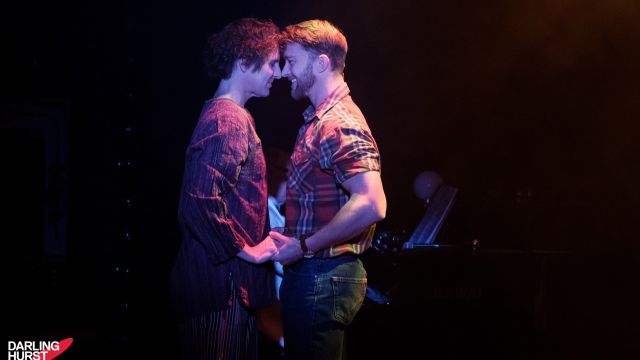Torch Song Trilogy
This is a stunning production where writing, direction, design and acting come exquisitely together. It takes Harvey Fierstein’s beautifully written script and his very delicately drawn characters through the maelstrom of discrimination and the fight for acceptance. Conceived in the late 1970s, when homophobia and vilification reigned, Fierstein’s trilogy was way ahead of its time, an inspiration to others to “imagine the possibilities that could lead to positive changes”. His character Arnold’s dream of a gay couple raising a family seemed inconceivable then – but was a harbinger of a brighter, more tolerant future.
The three plays are funny, witty, warm … yet heart-breakingly realistic. This revival by Stephen Colyer of his 2013 production finds the all of this and more. His direction is tight, his choreography beautifully timed and coordinated so precisely with the lighting effects designed by the creative Benjamin Brockman, that at some moments the audience reaction is whispered audibly. The skilful alliance between sound designer and musical director achieved by Nate Edmondson and Phil Scott is testament to their innovation and vast theatrical experience.
 Designers Imogen Ross (set) and Katja Handt (costume) endorse the collaboration that is a feature of this production. Together they have made colour a facet that unites the action. Ross has designed a set that is effectively workable and dexterously evokes the ambiance of each play. She plays with colours and props and moves furniture cleverly. In the interval before the final play – Widows and Children – the stage crew nimbly transforms the stage, moving in tall, colourful flats, changing curtains on windows, setting up a workable kitchen bench and positioning the many props that are used or referred to in the text. Handt picks up the colours and images in costumes (especially the colour-coordinated PJs in Fugue in a Nurser!) that define the characters and the time. Watch for the rabbits that cunningly conjure the charm of Arnold’s new apartment in Widows and Children.
Designers Imogen Ross (set) and Katja Handt (costume) endorse the collaboration that is a feature of this production. Together they have made colour a facet that unites the action. Ross has designed a set that is effectively workable and dexterously evokes the ambiance of each play. She plays with colours and props and moves furniture cleverly. In the interval before the final play – Widows and Children – the stage crew nimbly transforms the stage, moving in tall, colourful flats, changing curtains on windows, setting up a workable kitchen bench and positioning the many props that are used or referred to in the text. Handt picks up the colours and images in costumes (especially the colour-coordinated PJs in Fugue in a Nurser!) that define the characters and the time. Watch for the rabbits that cunningly conjure the charm of Arnold’s new apartment in Widows and Children.
The cast move with impeccable precision in intricately rehearsed blocking that pinpoints tense moments. Deftly delivered dialogue defines the characters’ fears and the fragility of the lives they live in a hetero-normal, bigoted society. Humour, included cleverly by Fierstein, and subtly accented by Colyer, endows the characters with the guts and resolve they need just to get by.

Simon Corfield expertly portrays Fierstein’s hero, the feisty but blighted Arnold Beckoff, through three soul-baring hours of changing emotions. His timing is faultless as he exposes the complexities of a character determined to be himself in a world that rejects everything that he is. Corfield’s physicality, his vocal flexibility and his expressive face define a performance that captures every nuance of Arnold’s struggle – and the sense of humour that sustains him.
Tim Draxl is convincingly distressed as the bi-sexual schoolteacher, Ed, determined to remain ‘closeted’ in a heterosexual partnership yet still maintain his relationship with Arnold. Draxl portrays Ed’s indecision in a moving performance that incorporates both his turmoil and his strengths. That Draxl has such an emotive singing voice adds to the poignancy of his characterisation.
The meticulously choreographed and paced telephone calls between Arnold and Ed are indicative of the intensity of character that can be developed through exacting rehearsal.
 Hilary Cole moves effortlessly between the roles of nightclub singer, Lady Blue and Ed’s girlfriend/partner, Laurel. She is sultry and suggestive as the former, bubbly and upbeat – but justifiably a little bewildered – as the latter.
Hilary Cole moves effortlessly between the roles of nightclub singer, Lady Blue and Ed’s girlfriend/partner, Laurel. She is sultry and suggestive as the former, bubbly and upbeat – but justifiably a little bewildered – as the latter.
Arnold’s lover and partner, Alan, is played with gentle humour and tenderness by Stephen Madsen, whose lithe flexibility echoes Corfield’s agility and physicalisation. So too does Imraan Daniels, who plays Arnold’s probationary adoptive son, David. Daniels’ depicts the cheeky, gesture-prone teenager with pert sassiness – and caring affection. His sticky introduction to Arnold’s mother, Ma (Kate Raison) and their eventual rapport is a cute piece of writing and acting.
Raison plays Ma with all the expected timing and typical accentuation of the ‘Yiddish mother’. Her sentences end in upward inflections. Her gestures are emphasised. She sweeps into rooms and situations with her convictions firm and her opinions unchangeable – which leaves Arnold still mourning her denial of his sexuality as forlornly as he always has.
Stephen Colyer’s production of this iconic trilogy gives it the elegance, lustre and sophistication that “the chutzpah of Fierstein’s creative spirit” deserves.
Carol Wimmer
Photographer: Clare Hawley
Subscribe to our E-Newsletter, buy our latest print edition or find a Performing Arts book at Book Nook.

